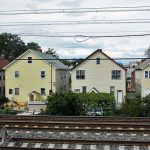 London is currently in the midst of a housing crisis, with prices booming and pricing many people out of even the possibility of owning their own property.
London is currently in the midst of a housing crisis, with prices booming and pricing many people out of even the possibility of owning their own property.
Whilst there are various arguments as to why this has occurred, and how it can be rectified, one obvious solution is to build more houses. In central London, near where I live and work, this has resulted in a huge number of new developments springing up, with inner-London seeing a 40% growth in new homes under construction.
Alas, the lack of prime land available for such locations tends to mean that they’re smaller properties and are being built in less desirable locations. From anecdotal experience, this often seems to mean being plonked right next to train tracks. Indeed, some developments seem so close that you could almost high five passengers as they passed your window.
Noise reduction
Suffice to say, living in such close proximity to a noise train track would be much more palatable if the noise of the trains was prevented from entering the property.
A recent project led by 3M Singapore with the country’s Housing Development Board (HDB) is going some way to helping to resolve these kind of issues. The venture will see research conducted into building materials that are capable of absorbing or reflecting noise.
The project is part of a wider Singaporean venture to build a completely smart city. It’s likely that the project will explore a range of possible materials for use in walls, floors and windows that can have a significant impact on the amount of noise that finds its way into the flat.
“We are living in a fast-changing urban landscape, with new planning issues to tackle and new housing needs to meet. We need new partnerships and innovative ideas to keep HDB moving forward,” the team say.
Suffice to say, the project is primarily focused on reducing noise from your neighbors rather than adjacent trains or traffic, and even the best dampening projects will suffer in summer when windows need to be opened. Nonetheless, with most cities squeezing properties into any nook and cranny they can find, these kind of technologies may at least go some way towards making them a little bit more habitable for the poor souls living in them.